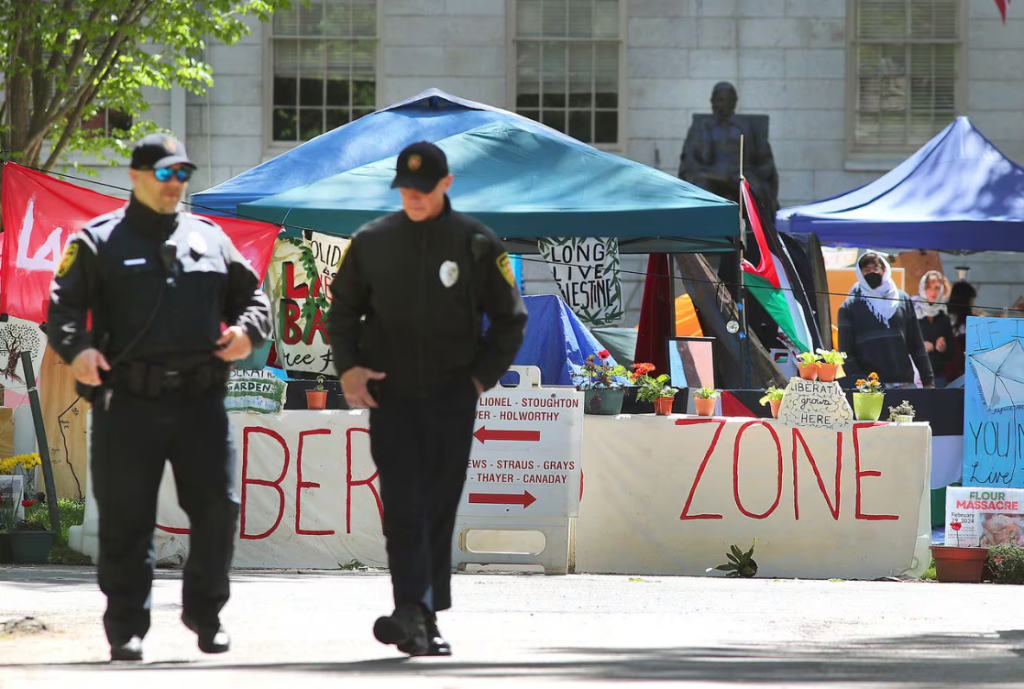【中美创新时报2024 年 5 月 11 日编译讯】(记者温友平编译)哈佛校园里的亲巴勒斯坦营地现在是大波士顿地区校园中最后一个矗立的营地。尽管临时校长艾伦·加伯在最后一刻试图与学生抗议者交谈,并最终警告他们将无限期停学,但大多数人还没有离开。《波士顿环球报》记者Hilary Burns、Maddie Khaw 和 Talia Lissauer 对此作了下述报道。
大学官方表示,从周六中午起,哈佛抗议者将被禁止进入校园,这意味着他们将失去校园住房,也无法参加毕业典礼。哈佛走出被占领的巴勒斯坦学生组织表示,“十多名学生”收到了停学通知。
学生和管理人员都不愿透露他们的下一步行动。 但在其他校园,愤怒的大学领导呼吁执法部门强行拆除营地,其中包括麻省理工学院,警方周五凌晨清理了营地并逮捕了 10 人。
上周,类似的场景在全国各地的校园上演。周五早些时候,警方还拆除了宾夕法尼亚大学和亚利桑那大学的营地。
大学校长面临着来自捐助者和保守派政客的巨大压力,要求对参与亲巴勒斯坦宣传活动的学生进行纪律处分,批评者称这导致犹太学生在校园内形成敌对环境;来自教职员工的巨大压力,其中许多人希望大学领导能够进行谈判 与学生一起寻找和平解决方案。
大学领导还担心营地会扰乱毕业典礼活动,因为在许多情况下,示威活动往往发生在校园的中心地带。4 月,警方在东北大学和艾默生学院的营地逮捕了约 200 名抗议者,本周在马萨诸塞大学阿默斯特分校逮捕了约 130 名抗议者。
加伯的发言人表示,他“对抗议者拒绝这个机会并决定继续营地感到遗憾”。
周三晚上,在 350 多名教职员工签署了一封公开信,呼吁高层管理人员与学生会面后,加伯于周三晚上会见了哈佛巴勒斯坦被占地区的领导人。自4月24日抗议活动开始以来,营地已扩大到哈佛大学校园内举行毕业典礼的部分地区。哈佛毕业典礼活动将于 5 月 21 日开始。
发言人乔纳森·斯温表示,加伯“听取了学生们对他们的担忧和目标的看法”。他补充说,“这次对话不是对抗议者要求的谈判。”
周四下午,大约 150 名哈佛大学教职员工、校友、学生和工作人员签署了一封单独发送给加伯的信,信中表示,他们“完全同意你关于(营地)必须结束的声明”。
周五凌晨 1 点刚过,哈佛走出被占领的巴勒斯坦组织在 Instagram 上发帖称,加伯表示,如果当晚不拆除营地,将会出现大规模停课。加伯说,如果帐篷立即拆除,将会有机会进行“更多对话”。
然而,抗议者并没有默许。
周五上午被停学的哈佛大学研究生伊丽莎白·罗斯在新闻发布会上表示,学生抗议者向加伯提出了四项要求:提高大学投资的透明度,逐步停止对武器制造商的直接投资,建立巴勒斯坦研究中心,以及拒绝武器制造商和那些“骚扰学生抗议者”的人的捐赠。
“我们告诉他们,我们愿意在合理的时间内共同合作,”罗斯说。
哈佛医学院内科医生、临床讲师、巴勒斯坦正义教职人员组织成员劳拉·吉马努斯 (Lara Jirmanus) 周五告诉记者,一名教职人员和一名工作人员也收到了纪律处分。吉尔曼努斯身穿工作服,声援加沙卫生工作者,拒绝提供更多细节。
吉马努斯谈到停学时说:“我们必须认真思考我们正在开创多么危险的先例。”她担心停学可能会“让这些勇敢的学生沉默并威胁他们的未来和职业生涯,而这些学生实际上只是想确保 我们正在让我们的民主负责。”
据一位发言人称,加伯在与抗议者的会面中表示,哈佛大学“不会将捐赠基金用作政治工具”。 他补充说,露营活动“必须结束,以便成千上万的学生的学术成就能够在哈佛毕业典礼上得到认可。”
“加伯校长明确表示,大学致力于对复杂问题进行理性讨论,包括正在进行的以色列与哈马斯冲突,”斯温说。“然而,正如他所说,‘发起这些困难而关键的对话并不需要、也不证明干预教育环境和哈佛的学术使命是合理的。’”
加伯周五还在校园里会见了反诽谤联盟主席乔纳森·格林布拉特,该联盟几个月来一直对大学校园反犹太主义报道不断增加表示担忧。格林布拉特表示,他们进行了“非常富有成效”的讨论。
他在给《波士顿环球报》的一份声明中表示:“我们支持他所采取的立场,表明他不会与营地中违反大学行为准则的人进行谈判。” “我们继续期待与哈佛大学合作,因为他们将确保包括犹太和以色列学生在内的所有学生在校园感到受到重视和欢迎。”
哈佛研究生沙博斯·凯斯滕鲍姆 (Shabbos Kestenbaum) 是起诉该校的六名学生之一,该校涉嫌放任犹太学生的敌对环境恶化。他表示,自 10 月 7 日以来,他作为一名犹太学生在校园里的经历“非常可怕”。
他说,停职信“是他们不当行为的自然结果”。 “希望能够以有意义的方式努力打击反犹太主义。”
哥伦比亚大学逮捕了 100 多名示威者后,这里和全国各地的抗议活动于 4 月开始。 据《纽约时报》报道,自 4 月 18 日以来,全国已有 2800 多名抗议者被捕。
哈马斯 10 月 7 日对以色列发动袭击,造成 1,200 多人死亡,其中大多数是平民,并夺走了约 250 人作为人质,此后,这些营地代表了自秋季开始的抗议活动的升级。 据巴勒斯坦当局称,以色列在加沙发动了报复行动,造成超过34,000人死亡,并夷平了大片领土,并将该领土推向饥荒的边缘。
随着围绕战争及其影响的冲突和争议主导的学年即将结束,许多学生和教师仍然对他们的校园经历深感不安。在哈佛,一切还没有结束。
“我认为人们变得越来越焦虑,”历史学教授艾莉森·弗兰克·约翰逊说。 “我们都百分百同意大学不会逮捕自己的学生。”
周五下午在哈佛校园集会的学生们从宿舍窗户上展开横幅,并表示他们将这些建筑重新命名为纪念已故的巴勒斯坦人。树上挂着一张海报,上面写着“艾伦·垃圾资助种族灭绝”,海报上画着加伯,他是一个长着角和尾巴的魔鬼,坐在马桶上。 将犹太人描绘成恶魔被广泛认为是一种反犹太主义的比喻。
计算机科学专业大二学生科乔·阿奇姆蓬 (Kojo Acheampong) 是周五因拒绝离开营地而被哈佛大学禁止的学生之一。他说,他的一些家人对停学感到不安,但作为一名学生活动家,他已经准备好面对这样的后果。
当被问到他是否担心被逮捕——考虑到麻省理工学院昨晚发生的事情——Acheampong 停顿了一下。
“我真的不担心,”他说,“因为我知道我们站在历史正确的一边。”
本报告使用了美联社的材料。 《波士顿环球报》记者杰德·洛扎达 (Jade Lozada) 撰稿。
题图:周五早上,哈佛大学警察走过哈佛大学校园内的一个亲巴勒斯坦帐篷营地。JOHN TLUMACKI/GLOBE STAFF
附英文报道:
Harvard’s encampment is the last one standing in Greater Boston
By Hilary Burns, Maddie Khaw and Talia Lissauer Globe Staff and Globe Correspondent,Updated May 11, 2024
The pro-Palestinian encampment in Harvard Yard is now the last one standing among campuses in Greater Boston. Despite a last-minute attempt by interim president Alan Garber to talk with student protesters, and a final warning they would be suspended indefinitely from school, most have not left.
The Harvard protesters will be banned from campus as of midday Saturday, the administration said, which means they will lose campus housing and cannot participate in commencement. Harvard Out of Occupied Palestine, the student group, said “over a dozen students” received suspension notices.
Neither the students nor administrators would say what their next steps are. But on other campuses, exasperated college leaders have called law enforcement to forcibly remove encampments including at MIT, where police early Friday morning cleared an encampment and arrested 10.
Similar scenes played out at campuses across the country over the last week; police also dismantled encampments early Friday at the University of Pennsylvania and the University of Arizona.
University presidents are facing immense pressure from donors and conservative politicians to discipline students participating in pro-Palestinian advocacy, which critics say have contributed to a hostile environment on campus for Jewish students, and from faculty and staff, many of whom want college leaders to negotiate with students and find peaceful solutions.
College leaders are also concerned the encampments will disrupt commencement activities, since in many cases the demonstrations tend to be centrally located on campuses. In April, police arrested about 200 protesters from encampments at Northeastern University and Emerson College, and some 130 protesters were arrested at the University of Massachusetts Amherst this week.
A spokesperson for Garber said he “regrets that the protesters have declined this opportunity by deciding to continue the encampment.”
Garber met with leaders of Harvard Out of Occupied Palestine on Wednesday evening after more than 350 faculty members signed an open letter calling on top administrators to meet with students. Since the protest began on April 24, the encampment has expanded into sections of Harvard Yard where graduation ceremonies are held. Harvard commencement activities begin on May 21.
Spokesperson Jonathan Swain said Garber “listened to the students’ perspectives on their concerns and goals.” He added the “conversation was not a negotiation of protesters’ demands.”
About 150 Harvard faculty members, alumni, students, and staffers signed a separate letter sent to Garber Thursday afternoon that said they “agree entirely with your statement that [the encampment] must end.”
Shortly after 1 a.m. Friday, Harvard Out of Occupied Palestine posted on Instagram that Garber said there would be mass suspensions if the encampment was not dismantled that night. If the tents came down immediately, Garber said, there would be opportunities for “more conversations,” the post said.
The protesters, however, did not acquiesce.
Elizabeth Ross, a Harvard graduate student who was suspended Friday morning, said at a press conference that student protesters presented Garber with four demands: Offer more transparency into university investments, phase out direct investments in weapons manufacturers, establish a center for Palestine studies, and reject donations from weapons manufacturers and those who have “harassed student protesters.”
“We told them we were willing to mutually work together on a reasonable timeline,” Ross said.
Lara Jirmanus, a physician, clinical instructor at Harvard Medical School, and member of the group Faculty and Staff for Justice in Palestine, told reporters Friday that one faculty and one staff member have also received disciplinary notices. Jirmanus, wearing her scrubs in solidarity with Gazan health workers, declined to provide further details.
”We have to be seriously thinking about how dangerous [a] precedent we are setting,” Jirmanus said of the suspensions, which she fears could “silence and threaten the future and the careers of these brave students that are really just trying to make sure we’re holding our democracy accountable.”
In his meeting with the protesters, which was also attended by Harvard College Dean Rakesh Khurana, and two faculty observers, Garber said Harvard “will not use the endowment as a political tool,” according to a spokesperson. He added the encampment “must end so that thousands of students can be recognized for their academic achievement at Harvard’s Commencement.”
“President Garber has made clear the University’s commitment to reasoned discussion of complex issues, including the ongoing Israel-Hamas conflict,” Swain said. “However, as he said, ‘initiating these difficult and crucial conversations does not require, or justify, interfering with the educational environment and Harvard’s academic mission.’”
Garber on Friday also met in person on campus with Jonathan Greenblatt, president of the Anti-Defamation League, which has for months expressed concern about rising reports of antisemitism on college campuses. Greenblatt said they had a “very productive” discussion.
“We support the stance he has taken in indicating he will not negotiate with people in the encampment who are violating university code of conduct,” he said in a statement to the Globe. “We continue to look forward to working with Harvard as they will make sure that all students including Jewish and Israeli students feel valued and welcomed on campus.”
Shabbos Kestenbaum, a Harvard graduate student and one of six students suing the university for allegedly allowing a hostile environment for Jewish students to fester, said his experience as a Jewish student on campus since Oct. 7 has been “horrible.”
The suspension letters “are a natural outcome of their misbehavior,” he said. “Hopefully there will be an effort to combat antisemitism in a meaningful way.”
The protests here and around the country began in April, after more than 100 demonstrators were arrested at Columbia University. More than 2,800 protesters have been arrested across the country since April 18, according to The New York Times.
The encampments represent an escalation of protests that began in the fall, after Hamas’s Oct. 7 attack on Israel that killed more than 1,200 people, most of them civilians, and claimed about 250 as hostages. Israel has conducted a retaliatory campaign in Gaza in which more than 34,000 people have died, according to Palestinian authorities, and has leveled broad swaths of the territory and pushed the territory to the brink of famine.
As an academic year dominated by conflict and controversy over the war and its fallout draws to a close, many students and faculty remain deeply troubled by their campus experiences. And at Harvard, it isn’t over yet.
”I think people are getting more and more anxious,” said Alison Frank Johnson, a history professor. “We all are 100 percent on board with [the idea that] universities don’t arrest their own students.”
Students rallying in Harvard Yard Friday afternoon unfurled banners from the windows of dormitories, and said they renamed the buildings in honor of deceased Palestinians. A poster hanging from a tree read “Alan Garbage funds genocide,” with a drawing of Garber as a devil, with horns and a tail, sitting on a toilet. Portraying Jews as demons is widely understood to be an antisemitic trope.
Kojo Acheampong, a sophomore studying computer science, was among those who were banned by Harvard Friday for refusing to leave the encampment. He said some of his family members are upset about the suspension, but he was prepared as a student activist to face such consequences.
When asked if he is worried about being arrested — given what happened down the road at MIT overnight — Acheampong paused.
“I’m genuinely not worried,” he said, “because I know that we’re on the right side of history.”
Material from the Associated Press was used in this report. Globe correspondent Jade Lozada contributed.

